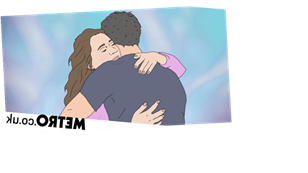Growing up on a council estate in Manchester during the 60s was tough – and not helped by the fact that my dad was a tyrant.
He was judgemental, laughed at other people’s expense – mine included – and, sometimes, was downright nasty. As an example, when I told him I was being bullied at school, he said that I should ‘grow some balls’.
Dad also demanded silence in the home whenever he was around and expected me and my brothers to be out of sight (preferably in bed) by the time he sat down to dinner.
My mum tried to get him to stop picking on me and they had some blazing rows about it. But mostly she just let it happen, because the alternative was a massive confrontation, which was extremely stressful.
For years, I resented my dad’s total disinterest in my point of view. By the time I was a teenager, our relationship – if you can call it that – had become toxic. I wanted freedom, but he didn’t like me growing up and didn’t like my friends.
When I eventually moved 170 miles away from home, it was to escape my dad. I stayed in touch, visiting occasionally, but mostly I just spoke to mum on the phone.
Everything changed about six years ago, when out of the blue, he had a personality transplant in his 70s.
It happened following a diagnosis of Parkinson’s disease – something he is slowly dying from – and the effect the illness has had on his personality has been dramatic and surreal.
Rather than be rude or ignore me, my dad started joining conversations. He complimented me and said my outfits were nice. He let mum make decisions about their life together. He took an interest in my life.
It was totally out of character and felt strange, yet nice.
But his stubbornness remained for a long time. When I suggested that he go jogging or swimming because it can slow the progression of the disease he just said, ‘You’ve got to die of something’.
It was frustrating because I don’t want him to die and leave mum on her own, or for him to experience unnecessary suffering. But there wasn’t any point arguing about it, he had made up his mind.
It’s a strange feeling watching someone slip away, but I’m pleased to have seen this new side of him
Dad is now on end-of-life support and needs full-time care. He’s made it to 84, so he’s not done badly, but he probably won’t see 2021. His quality of life is very poor, but I’ve accepted it and hope he passes peacefully when his time comes.
Despite everything, his illness has changed our relationship for the better.
These days (before lockdown), we sit together, look at photographs, chat about what I’ve been doing and watch the footie. He can’t speak much and can barely stand up, but he seems interested in my life in a way he never was before.
Occasionally a glimmer of my old dad sneaks through, like when I visit and he is more interested in the TV than me, but mostly, he’s a kind old man, more attentive than he’s ever been.
As we all face the prospect of his imminent death, I see this helpless old man, resigned to his fate, his tyrannical personality gone. It’s a strange feeling watching someone slip away, but I’m pleased to have seen this new side of him. I hope that we will be able to catch up again properly soon.
Dad has never apologised to me. He has only justified his behaviour as correct, and mine as incorrect – but I try not to think about that.
While I’m sad that we didn’t have a better relationship while I was growing up, I’m glad that we have had the chance to enjoy each others company, if even for a short time.
Please note that the author’s name is a pseudonym.
Source: Read Full Article
